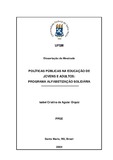| dc.creator | Orquiz, Isabel Cristina de Aguiar | |
| dc.date.accessioned | 2008-02-19 | |
| dc.date.available | 2008-02-19 | |
| dc.date.issued | 2004-12-17 | |
| dc.identifier.citation | ORQUIZ, Isabel Cristina de Aguiar. PUBLIC POLICIES IN THE EDUCATION OF YOUNGSTERS
AND ADULTS: LITERACY SOLIDARITY PROGRAM. 2004. 123 f. Dissertação (Mestrado em Educação) - Universidade Federal de Santa Maria, Santa Maria, 2004. | por |
| dc.identifier.uri | http://repositorio.ufsm.br/handle/1/6797 | |
| dc.description.abstract | The present paper integrates into the Research Line Formation of Teachers of the Post Graduation Program in Education CE/UFSM. The education of youngsters and adults is a relevant issue in the present educational context. According to the analysis of the pertaining legislation LDB 9394/96, Report of the CNE/CEB 11/2000, Education National Plan and the Federal Constitution of 1988, in which it was tried to analyze the results achieved by the Literacy Solidarity Program (PAS) together with the Federal University of Santa Maria UFSM, in the process of Formation of Popular Teachers. The cities that made part of this research/project are partners of the Federal University and of the PAS. The pedagogical activities were performed in Piauí, in the Semi-dry region (in the towns of Caldeirão Grande do Piauí, Fronteiras, Pio IX, and São João). As long as the research was carried out a great involvement and consciousness of the city coordinators, of the pedagogical monitors and of the teachers eager for the acquisition of the new knowledge related to reading, to writing, and to specific areas of knowledge such as mathematics and biology was observed. It was testified, through the use of a questionnaire and through the participating observation, that not only the teachers but also the learners consider that it is through education that they are going to have a more significant participation in order to achieve a better effectiveness in their communities and the articulation of actions which seek changes in the political and socio-cultural context. Therefore, the Literacy Solidarity Program has demonstrated to be as one of the ways to decrease the illiteracy rates in Brazil, which is a country with serious regional differences. The systematization and analysis of this experience (which joins governmental and non-governmental institutions) have a fundamental importance to the comprehension of the process and the reinforcement of the citizenship of all the subjects involved as well. | eng |
| dc.format | application/pdf | por |
| dc.language | por | por |
| dc.publisher | Universidade Federal de Santa Maria | por |
| dc.rights | Acesso Aberto | por |
| dc.subject | Programa alfabetização solidária | por |
| dc.subject | Educação de jovens e adultos | por |
| dc.subject | Políticas públicas | por |
| dc.subject | Literacy solidarity program | eng |
| dc.subject | Youngsters and adults education | eng |
| dc.subject | Public policies | eng |
| dc.title | Políticas públicas na educação de jovens e adultos:
programa alfabetização solidária | por |
| dc.title.alternative | Public policies in the education of youngsters
and adults: literacy solidarity program | eng |
| dc.type | Dissertação | por |
| dc.description.resumo | O presente trabalho integra-se à Linha de Pesquisa Formação de Professores do Programa de Pós-Graduação em Educação CE/UFSM. A Educação de Jovens e Adultos é um tema relevante no atual contexto educacional. Através da análise da legislação pertinente LDB 9394/96, Parecer do CNE/CEB 11/2000, Plano Nacional de Educação e Constituição Federal de 1988, procurou-se analisar os resultados alcançados pelo Programa Alfabetização Solidária (PAS) em conjunto com a Universidade Federal de Santa Maria UFSM, no processo de formação de alfabetizadores populares. Os municípios participantes da pesquisa são parceiros desta Universidade e do PAS. As atividades pedagógicas foram realizadas no Piauí, Região do Semi-Árido (Municípios de Caldeirão Grande do Piauí, Fronteiras, Pio IX e São Julião). No decorrer da pesquisa foi constatado um grande envolvimento e conscientização dos coordenadores(as) municipais, monitores(as) pedagógicos(as), alfabetizadores(as) na busca da aquisição de novos saberes relacionados à leitura, escrita, bem como de conhecimentos específicos, como matemática e biologia. Verificou-se, através da aplicação de questionário e da observação participante, que alfabetizandos e alfabetizadores consideram que é por meio da educação que se efetivará uma participação mais significativa em suas comunidades e a articulação de ações que visem mudanças em seu contexto político e sócio-cultural. Portanto, o Programa Alfabetização Solidária tem se apresentado como uma maneira de atenuar os índices de analfabetismo no Brasil, país com graves desigualdades regionais. A sistematização e análise desta experiência (que une organizações governamentais e não-governamentais) têm importância fundamental para a compreensão do processo de fortalecimento da cidadania de todos os sujeitos envolvidos. | por |
| dc.contributor.advisor1 | Tomio, Fabricio Ricardo de Limas | |
| dc.contributor.advisor1Lattes | http://buscatextual.cnpq.br/buscatextual/visualizacv.do?id=K4784606Z1 | por |
| dc.contributor.referee1 | Natividade, Marisa Oliveira | |
| dc.contributor.referee1Lattes | http://buscatextual.cnpq.br/buscatextual/visualizacv.do?id=K4784817A6 | por |
| dc.contributor.referee2 | Melo, Regina Maria | |
| dc.contributor.referee2Lattes | http://buscatextual.cnpq.br/buscatextual/visualizacv.do?id=K4788664T6 | por |
| dc.creator.Lattes | http://buscatextual.cnpq.br/buscatextual/visualizacv.do?id=K4778452H9 | por |
| dc.publisher.country | BR | por |
| dc.publisher.department | Educação | por |
| dc.publisher.initials | UFSM | por |
| dc.publisher.program | Programa de Pós-Graduação em Educação | por |
| dc.subject.cnpq | CNPQ::CIENCIAS HUMANAS::EDUCACAO | por |


